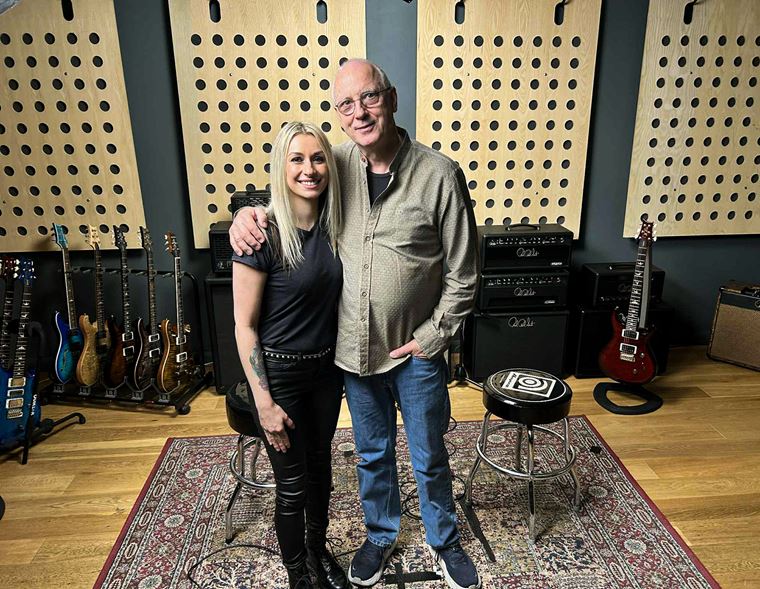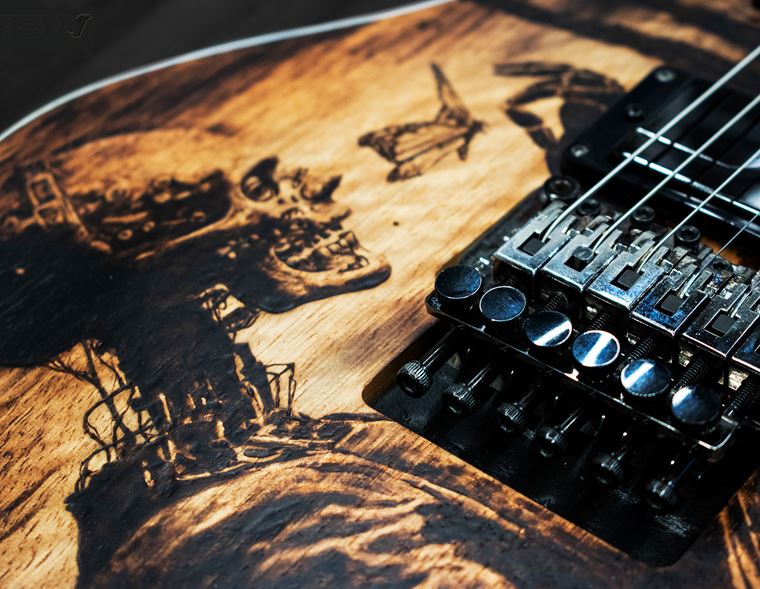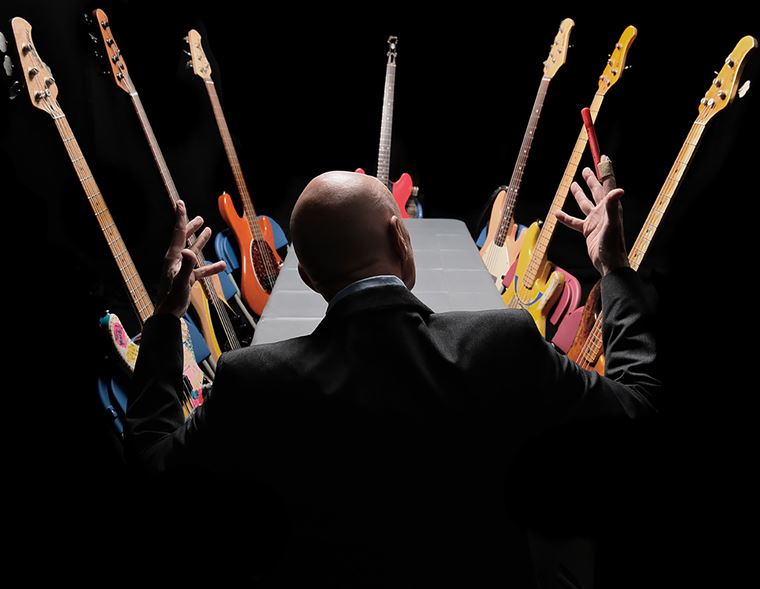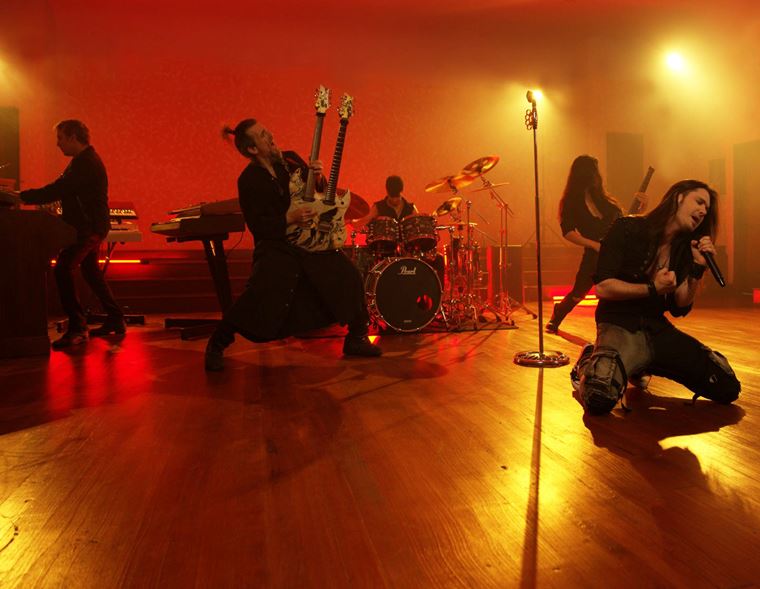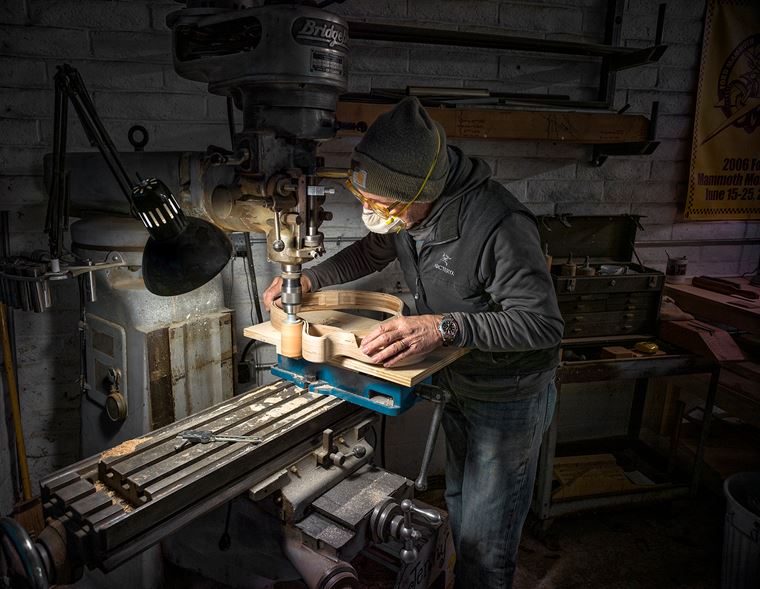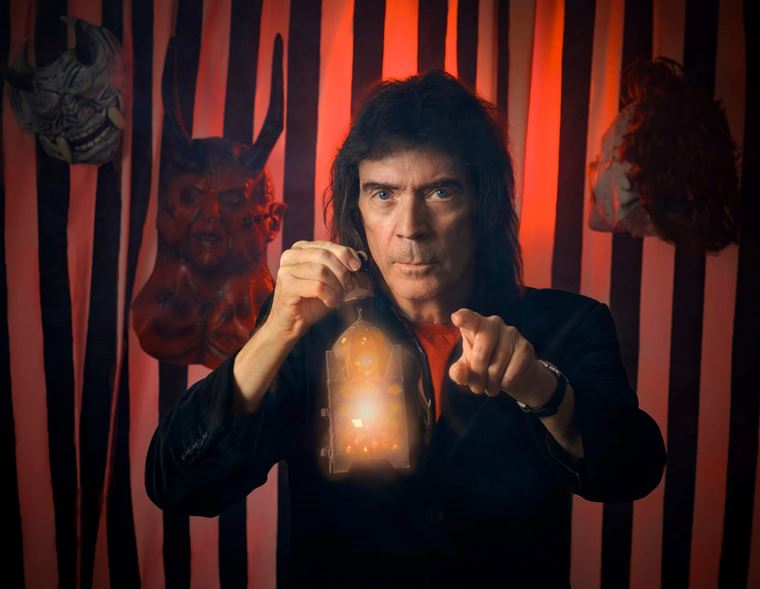EMPLOYED TO SERVE: Sammy Urwin Talks Tours, Labels and the Realities of Being in a Band in 2023!
Kerrang cover stars.
Album of the Year awards.
Tours with some of the biggest metal bands on the planet.
Whatever Employed to Serve are doing, it’s working!
Employed to Serve are an exciting, epic and brutal sounding band indeed, injecting the current scene with a sound that's uncompromising, but an attitude that’s totally inclusive and positive. Grafters with the talent to match, ETS have been making increasingly bigger waves in a correspondingly bigger pool. This has culminated in a hugely successful recent tour with French titans Gojira and up-and-coming New Zealanders Alien Weaponry. Talk about a lineup? Metal fans up and down the country had waited again and again for these shows, which were continually postponed due the world’s pandemic status. This meant that when these bands were finally able to tour, they tore the roof off each venue they played at. Guitarguitar was there to witness the glory of one such show, and we were therefore more than a little excited to arrange a chat with ETS’s Sammy Urwin.
Rather than follow the usual guitars and gear approach (fear not, that’s coming later in the year!), we wanted instead to talk to Sammy about the realities of being in a successful band in 2023. Employed to Serve are destined for huge things, but they are current;y still working their way to that destination, and that trajectory is a fascinating thing to learn about, as you’ll see.
On top of that, Sammy and his wife Jutine (also Employed To Serve’s vocalist) also run their own record company, Church Road Records, so there was a whole extra level we wanted to explore, such as how they operate whilst running a band, and how recent times have affected them. Luckily, Sammy is an extremely friendly and laid-back guy, and was not only happy to chat but also felt that the direction we wanted to take the conversation was a valid and interesting one. We cover a lot of ground in this extended, full-length transcription, and we hope you stick with us till the end because there’s an absolute bucketload of advice and insight to be had. Whether you are starting out or looking to move your situation up a gear, Sammy’s words will undoubtedly help, inform and cast light on a number of topics. Want to know about the highs and lows of touring? The mania and the boredom? The trials, tribulations and joys of playing metal on the world’s stages whilst releasing records every month? Read on…
Sammy Urwin Interview
Sammy joined us for a Zoom chat mere days after returning home form the European leg of the Gojira tour. As we’d previously met, we began our call with a quick catch up and a brief outline of what we wanted to cover in the call. That brings us roughly to here, where we’ll pick up the reins…
Guitarguitar: Well, we may as well start with what you’ve just done. You’ve just come back off the road from a big tour with Gojira, which is an immense achievement. There’s lots I’d like to ask you about it, but first off: what was your day-to-day like, as a member of a touring band in 2023, supporting a big band?
Sammy Urwin: My day-to-day was pretty similar most days, to be honest with you. That’s kind of a saving grace in itself. Having a routine that takes you through the entire day on tour is amazing because sitting around all day twiddling your thumbs in green rooms is beyond the worst! Endless scrolling on your phone! So, for me, it was a case of waking up around nine or ten, straight on to the laptop, doing emails. We had quite a lot of new singles and announcements for the label whilst we were away, so those were things we still had to be on top of.
"That was our first goal: how do we get shows with these bands? Oh! Book them and put ourselves on the bill!"
So, I’d start by doing all that, making sure all press was handled, queueing things up with the social media platforms, making sure everything was still ticking away there and wasn’t falling by the wayside. Then it would roll round to about two-thirty, three o’clock and we’d load in our gear, have maybe about an hour to chill out before soundchecking. Then it would be BAM!, straight into getting ready for the show! So yeah, it could be quite full-on at times, because obviously we were still fitting work in whilst on tour, but I must admit I’m pretty thankful for it. I find that whole twiddling your thumbs, not-knowing-what-to-do-with-yourself thing takes its toll after a while, you know?
GG: Yeah, I know exactly the feeling, haha! So, I imagine most people reading this article are going to be familiar with your band, but for those who don’t, it’s worth them knowing that you guys run your own label. One of the things I thought was really interesting when we first started talking was that idea of the community that seems to be built around your band and the label. I’m wondering about the energy that surrounds all that. You’ve been in bands before, so with Employed to Serve, did you always want there to be a sort of community spirit and DIY ethos? Is that something you did on purpose, or was it a natural evolution?

(Photo: Andy Ford)
SU: I guess a bit of both, really. Being honest, when we started Employed to Serve, we weren’t thinking ‘One day we’ll be supporting Gojira’ and doing all this kinda stuff. We just wanted to form a band to play with other bands in the scene who we looked up to, like Svalbard, Bastions, Palm Reader, you know? These other bands that started a little bit before us and were out doing bits, that hugely inspired us. The main goal was: let’s start a band, so we can play with these bands, befriend them and go on tour.
Essentially, going into a band with that mentality, you can’t help but generate a bit of community, as opposed to starting a band from the get-go going, ‘We wanna be an arena band!’, you’re gonna miss out on all of that stuff! You end up meeting these people, booking tours with them, getting in splitter vans with them for weeks on end…yeah, so I guess it was just a natural byproduct of what our mission statement was. Start a band to get in with the bands that we appreciated at the time. From that, it’s grown into an even bigger network as the years have gone by.
GG: So networking is obviously an important element. I’m wondering if, in your booking of gigs and setting up of tours - which presumably you would have done DIY to begin with - was there a process of finding potential like-minded people to build your own sort of team, if you like? Was that idea something that you guys took advantage of?
SU: Yeah, definitely. When you’re working with other bands and other artists, you help each other. Someone might be good at doing posters for the gig, or someone would be good at doing band logos. For me and Justine it was a case of: we put on shows and we booked a lot of the tours ourselves. That was our first goal: how do we get shows with these bands? Oh! Book them and just put ourselves on the bill! We basically shoehorned our way in. But yeah, that’s the beauty of it being a community and a network: people bring different things to the table. For us, a big part of that was booking tours. We were hell bent on getting something written so we could get out and start playing shows! Start building up that awareness, I suppose.
Touring: Building on Success
GG: Mmm, touring is something I’m interested in talking to you about because you’re such a seasoned touring player. Going from gigging locally to organising a tour: was it obvious to you when it was time to make that move? And was it a difficult move, to go from one gig to setting up a full tour?
SU: I see what you’re saying. Yeah, I guess there was more pressure because you never know what you’re getting into. So, for example, the way we’d do it is, we’d find people who’d book similar bands in a certain city and say, ‘Ah, this seems to be the person! Let’s get in contact with them’. If you’ve never met them before, there’s always the fear of the unknown, like: are they gonna turn up? Is anyone gonna be there? You know, they’ll say they’ve booked it but they haven’t done anything. But initially it seemed okay because my thought process was: we do this promotion thing where we’re from, so effectively it’s just us working with someone else doing exactly what we do but in a different city. So, it never seemed too daunting because we’d get in contact and everything seemed to be fine but I suppose there was always that part of us that was like, ‘We’re jumping into the unknown’, you know what I mean? Back then we weren’t staying in hotels or anything, we were sleeping on the person’s floor who was booking us! There was always that element of fear! (laughs)
But I would say that was only very slight. I kinda felt like I’d seen enough bands before us do it, do the whole DIY ethos, so I thought it must be sustainable and it must be doable. And if we find anyone who is scary, then we just won’t play with them any more haha!
GG: Yeah, totally! And then of course, there came a point where things got bigger: you guys have been on the front cover of Kerrang, you’ve had your albums voted album of the year and you’ve just come off a tour with Gojira. Now, that tour is not gonna be you phoning up promoters or venues one at a time and hooking together a tour! So, that change: was that something that was quite abrupt in your career? How did that manifest itself?
SU: It’s all been pretty gradual. There’s obviously been benchmarks on the way that’s been like, ‘wow, holy shit!’, and fortunately that’s kept on going. I suppose the tipping point for us where the more professionally put together tours and some of the media coverage started to come in was around the time we released our second album, The Warmth of a Dying Sun. I think the real lightbulb moment in terms of, like, going ‘holy shit’ for me was when we did our headline tour to support that record and did the London show. I remember going downstairs and there being, like, a decent amount of people there! I was like, ‘Oh! There's a real group of people here who’d like to see us play!’ I remember that night when the lights went down and people cheers, I was like ‘Oh my god, we’ve made it! This is all I’ve ever wanted, for the light to go down and for people to cheer!’ Yes, I guess the press really started to take notice then. But I wouldn’t say it was like that happened and then it was like this level we’re at now, so to speak. It was still a gradual build along the way.
"The real knack to this industry is perseverance more than anything."
Even then, I was proud of that band we were but if you’d have presented us with a tour of this magnitude back then, we’d not played on stages that big and in front of that many people, I don’t know if we’d have been ready to jump into something that serious. I’m always kinda glad that it’s been a nice steady rise to al these points, because, you know, I feel like we can go out in front of a crowd that big and a stage that big now and feel comfortable doing it.
GG: Well, you absolutely destroyed it in Glasgow.
SU: Oh, thank you dude.

(Photo: Andy Ford)
GG: There were three bands on, and people were probably expecting you to be quite good, but even so: do you not think the reception you got was even more intense than maybe you anticipated?
SU: Definitely, but then, that being said, Glasgow is always, I dunno, up another level! We’ve got quite a good history of shows in Glasgow, but yeah, definitely stoked! I wouldn’t be surprised - being an opener on a tour that big - for people to just stand and watch us, arms crossed. That wouldn’t even be a problem because it’s early in the evening, people have just finished work and what have you, but yeah, to have the response we did was awesome.
GG: It was amazing. So, am I right in saying you’re now able to do Employed to Serve as a full time endeavour? You don’t have to work a day job any more?
SU: That’s more down to the record label, for me and Justine. So yeah, we’re still at that awkward point with ETS of carrying on growing: you get to a certain point where you’re making more money but, like, the overheads get bigger, and certain things come into it where you want to have things to make your life more comfortable on the road and that of course swallows money up as well.
We’re getting to a sort of tipping point where it will be possible in the future, but we’re just trying to get the resting balance up to a good level, particularly after covid. We had a lot of things go tits up, as many bands did, during the pandemic. We had an American tour fall through, and we had the visas paid for that. We also spend lots of money during the pandemic getting our in-ear rigs built and things like this, but of course we didn’t have all the festivals and stuff to reimburse us, so yeah, everyone in the band, we’re still working jobs around it. But the idea is hopefully at some point there will be enough to at least keep us going.
GG: That’s the dream, man! That’s the dream!
SU: Yeah, for sure!
GG: Now, social media. I hope all artists reading this article understand how important it is to engage with social media, but how important was social media advertising for you guys? Did you make use of paid adverts and paid campaigns, things like that?
SU: Definitely, yeah! They can be really helpful, and particularly in the early days, maybe not so much now. There was a bit of a misconception with the paid adverts, because I think people thought it was either cheating or a dumb thing to do for X, Y and Z reasons. But the way I came to look at it - particularly when people who, you know, actually knew about it explained it to me - was like, actually: you’ve got a product, you’re proud of it, you’ve spent a lot of time working on it. You want to make sure you get it in front of as many people as possible.
I don’t know as much about it as Justine and our manager, but you can really hone in on who your audience is. Like, super-specific, it’s not like you’re chucking money on an Instagram post and it’s just getting shared to whoever and it’s kind of irrelevant, you know? You can really go to town with fanbases and where they’re situated. If you’ve got a tour coming up in Spain or something like that, you can make sure fans of metal in Spain are specifically seeing that advert.
So yeah, I think they’re a good thing. Some people don’t use them and that’s fine but I definitely think they can be beneficial. You’ve spent so much time working in something, you want as many people to see it as possible, don’t you?
Attitude
GG: Yeah! Mot definitely, it seems like shooting yourself in the foot otherwise. So, this next question isn’t very specific, but I always come back to this Tom Waits quote: ‘The way you do anything is the way you do everything’. Using you and your band as an example, you make music that is uncompromising and relatively niche - in other words, you’re not Coldplay - and you are very successful at getting all the right people to pay attention. Put simply, you are being effective. I’m wondering, how important is energy and intention in terms of getting there? Like, doing stuff today and not putting it off to tomorrow, doing the boring grunt work today instead of playing a video game or whatever. How much of your life sort of comes down to doing boring tasks that are obviously necessary in order to get to the next stage? I have a feeling a lot of bands might not want to do that. Is that something we can talk about?
SU: Yeah, 100%! I think it’s a really good topic to discuss because the thing I’ve been thinking about a lot recently, particularly in this industry, the real knack to it is perseverance more than anything. It’s a slow burn most of the time - particularly doing heavy music - to kind of get to a point where people start paying attention. I feel like as long as you’re consistent in what you’re doing, and as you say, not putting off the boring stuff, or even trying stuff and when it doesn’t work immediately you say ‘Ah, fuck it! I’m not gonna do it any more!’ I think it’s so important to be consistent with your work and what you do. And just sticking it out as well. It can be hard, because doing this, there’s not a lot of money in it, band members come and go, the odds sometimes get stacked against you but I think: if I’m ever in a really bad mood about something, whether it’s the band or whatever, it’s like ‘go to bed!’ (laughs) I’ll wake up tomorrow and maybe it wont be 100% better, but I’ll feel 80% better! Just pick up where you left off and carry on.
There are so many people out there that are so motivated, I think that if you really want to make an impact, and are really serious about what you do, then you do have to kind of crack the whip on yourself. It’s finding that happy balance though: nowadays the whole burnout thing is talked about a lot, and quite rightly so: it’s super-prominent in the music industry. But you have to find that happy balance: working hard, enjoying what you’re doing - because ultimately, if you’re not enjoying it then what’s the point, you know? - and yeah, allowing yourself some time to breathe.
But yeah, cracking on and doing the boring stuff: unfortunately that is part of it! As you get bigger as well, there might be some people who take on some of the boring stuff, but you’ll probably be given a new plate of boring things to contend with! (laughs) I think it’s also important to realise that you’re never gonna get to a level, necessarily, where everything’s done for you, everything’s easy and you just walk out on stage and play. There will always be something to do, so the sooner you realise that, the better! There’s always gonna be some grafting. Whether you’re playing the pub down the road or you’re playing the O2 arena, there’s gonna be work to do on some level! (laughs)
GG: That’s a good attitude: it means that you bring the same ‘A-game’ to the pub down the road, so that when you eventually get to the O2 arena, you’ve got the skills and mindset of a pro.
SU: Yeah, 100% man, for real. That’s another one, and that’s always been the sort of ethos for us, without being cheesy: give it the beans whether there’s one person in the crowd or thousands, you know? Because, one: you may as well enjoy it because you’re there, and also that one person could have travelled from wherever and there’s nothing worse than getting a bit uppity if you’re like, ‘Argh, we should be playing somewhere much bigger!’
GG: It’s a bad look isn’t it? Nobody wants to see that.
SU: Yeah, exactly.
Merch & Venue Tax
GG: So, there’s something I’d be interested in having your opinion on. It seems normal for bigger venues to take a really big cut of the merch money. Did you face that yourself, how much of an issue is that, and are there ways around it?
SU: It’s a big issue, for any band. Our overheads are big but then so are Gojiras, you know what I mean? They’ll sell more merch but their production is infinitely bigger (laughs) so it’s all the same really.
Yeah, I honestly can’t really wrap my head around it. I’m not sure what the solution’s gonna be because, I mean, in some places it’s like 25%! That’s crazy! And obviously, bands have cuts taken from all their other places as well, you know, that’s just how it goes. So, when you get your final figure, it can be a bit disheartening, that’s for sure. And yeah, it’s gained a lot of momentum on this one, because of the initial kick-off of the pricing of Gojira’s merch and then people on the flipside of the music industry explaining why they are this high. It’s generated a lot of people to say, well, what’s the next step in this? Because yeah, unless bands are getting a cut of the drinks sales as well, it seems highly unfair to me. I know you’re in the venue so you’re using their space to sell your merch, but even if they were taking a percentage, 25% just seems ludicrous to me.
GG: When we were young kids, we used to see Iron Maiden with their own aeroplane, and they had that because each gig of theirs had their crew carrying literal bin bags full of £20 notes for their awesome merch, and that went straight the band. But then, nowadays, you hear stories about bands saying they’ll sell their merch outside the venue as if they were bootleggers, to avoid those mad fees. I’m thinking, that’s not really an answer.
SU: Yeah.
GG: And the other one is, if I was coming to see a band and the merch was so high, I could go home and buy the shirt later on from the band’s webstore, where it’s better for the band and probably a bit cheaper for me! But then, I don’t actually know: is it better for the band that way? Some bands - not Employed to Serve but smaller bands - need that night’s money in order to get to the next venue. It’s no good to have it a month down the line.
SU: Oh, that’s the biggest thing that we struggled with. Particularly last year, we weren’t getting paid until months after the fact and it’s like: we have to pay for petrol, pay for hotels and all the rest of it. It’s a nightmare. On the one we’ve just done, I won’t be surprised if it’s months and months down the line before we get the merch fees.
I don’t think it’s possible to carry on operating this way, particularly for a support band. There’s no room to grow if you’re putting all this red tape in the way. I don’t know what the answer is: it’s hard. I don’t want to put all the pressure on the bigger artists to do what needs to be done, like boycott it, but hopefully with enough people talking about it, these venues will take notice, maybe? I don’t know.
GG: Maybe. It’s like, if you can get Lars Ulrich to get angry about Napster twenty years ago…(laughs)
SU: Yeah, where’s Lars now? I mean, it must still apply to Metallica, right? I’m sure they get a big old merch cut?

(Photo: Andy Ford)
GG: I’m sure, because otherwise the venues wouldn’t let them use their place for a show. It’s interesting because you’re in that place where you’re not a small band but you’re not Metallica either, and I’m thinking ‘how does this all hit you?’ There you go, it hits hard!
SU: Yeah, real badly. Cashflow was such a bad issue for us last year. Constantly a game of chasing our own tail, and it feeds back into that whole thing of the band becoming something we can live off, because off the back end of the pandemic, it’s like, funds have been depleted, but then you get paid for this other job, but the money doesn’t come in till much later. At that point, something else has come up and it’s like ‘Alright, quickly! Chuck that money over there!’ It’s chaos. Maybe some sort of legislation will come in, you never know.
GG: That would be good. I doubt it!
SU: I know! I see some people who aren’t to aware of the situation saying ‘Oh, but the venues really struggled during the pandemic!’ and it’s like, well, I don’t think the big ones who are owned by huge companies struggled that much. It’s more your small, independent venues that struggled. I’m pretty sure Alexandra Palace is alright, actually! (laughs)
GG: I think so! It’s also that way: the pubs were struggling, the restaurants were struggling, so the government came up with condescending things like Eat Out to Help Out’. People go to a venue like the Academy, as you said, they are still going to be pulling pints all night long, which involves a large profit.
SU: Yeah.
GG: So, why do they have to make it so that bands have to charge £40 for a t-shirt? There’s a fair enough question: did you find that it actually meant less merch sales than usual? Or were the numbers of the sales kinda the same?
SU: The sales were relatively the same. Overall, last Summer was better for us, but it’s hard to tell with these things - particularly with a support tour - because it’s always fluctuating, but in terms of Gojira’s numbers, I’m not entirely sure.
GG: Of course.
SU: It still seemed to me that they were selling a lot of numbers. That’s the thing for me: when I saw the price list - cos I didn’t see it until it got posted online - it didn’t particularly shock me that much, because unfortunately that’s what I’ve come to expect. I remember even ten years ago, Dying Fetus were charging like £25 for a tshirt: that’s Dying Fetus and that’s ten years ago, so! And I know Gojira are super environmentally conscious, so they print on expensive branded t shirts, which of course adds more money to the unit price. So, yeah. Luckily, people seem to still be willing to support people. I couldn’t say I noticed a huge drop off in merch sales.
Running a Label
GG: That’s heartening! That’s good to know. So, being as specific as you like, as far as your audience is concerned, you are a musician who has a record label. That may be different from your own perspective, in terms of your daily tasks and so on, but either way: what are the downsides of also having this record label in terms of your life balance, sacrifices and so on?
SU: It’s a good question, that, because I’ve still been kind of working it out. It’s only become a full time endeavour since mid way through the pandemic. Before that, I was doing garden maintenance, and I was only doing three days a week so it would allow the second half of the week to do band stuff, essentially. Now, because I work 5 days a week now but have my evenings free, it has cut down on the time I have to be creative.
"There are so many people out there that are so motivated. I think that if you really want to make an impact, and are really serious about what you do, then you do have to kind of crack the whip on yourself."
But, I’m in the process of trying to figure out a new schedule, because I’m still able to write at the moment but I haven’t got as much time as I did before th record label became a full time thing. It definitely has eaten into my creative time a bit and that’s fine because, at the end of the day, being a musician working for the label and working with other musicians, I know how important their music is. I would never want to drop the ball or not pay the right amount of attention to that. But yeah, looking forwards, I’m trying to find out what I can do: maybe even work a bit on the weekend to free up a bit of time later in the week. It’s all a bit of a balancing act, but I guess that Justine and I are lucky in the respect that we are our own bosses, so as long as we get the work done, and nothing falls by the wayside, we can kinda tailor make our schedule to better fit time to write. It’s getting towards that time where our last album, Conquering, has been out for a bit. We’re not in a mad rush to write the next record, but we always want to have stuff in the tank, ready to go. Moving forwards, I think I’m gonna have to start moving things around a bit to better fit my time.
Cos that’s the thing as well: I’m not rock n roll at all! Most people will probably start their working day later and write music until 4 in the morning or something! I’m an ‘in bed a ten o’clock’ kinda guy! (laughs)
GG: Well, it’s our mutual friend who says ‘early to bed, early to rise, makes a man healthy, wealthy and wise’!
SU: There you go! He is a wise man, so there you go!
Brexit
GG: He’s not wrong! I wonder, what, so-far, has brexit meant to you as a band, and to you as a label as well?
SU: Oh it’s been pretty awkward! (laughs) As a label, it’s not great now but it was chaos to begin with. No one knew what was going on, but we’re fortunate now that we’ve got a shop set up with Deathwish EU, so they handle our distribution over there, and we’re able to stock them up with our subscriber copies. We actually run a subscription service and we put out releases at least once a month. You can be either a digital or a CD or vinyl subscriber and when brexit initially happened, we lost loads of EU subscribers because it would mean they were paying an extra 20 euros on top of their subscription fee, so that was fair enough. With time, we’ve started to figure out workarounds now, having the subscription service handled by Deathwish EU, they have a shop over there. So, yeah, it’s been tricky. It’s made the prices go up for a whole lot of things.
"It's important to realise that you're never gonna get to a level, necessarily, where everything's done for you, everything's easy and you just walk out on stage and play. There's always going to be some grafting."
With touring, you have to have a carnet now (an expensive document listing absolutely every piece of equipment you have - Ray), which we’ve been doing. You turn up to the customs place and no one seems to know what’s going on (laughs) or really care, but it’s one of those things you gotta have because if you get caught out by the wrong person, there could be hell to pay. We’re looking into whether you do actually need the carnet, because we read something the other day that said that if you’re travelling with your gear, it says you don’t need a carnet. It’s only if, for example, a band like Gojira has trucks and trucks worth of gear, they’d need a carnet because they are in one bus, and another truck’s got their gear so they need a carnet for that.
I’m kinda hoping that is the case because my main concern with brexit was that when we started going ot Europe, you didn’t need a carnet. We could get away with little-to-no money, getting paid with door deals and stuff (taking a split of ticket money as opposed to being paid a pre-arranged performance fee - Ray). I think it sucks for new bands coming up, because if they wanna try to play some shows over in Europe, they’re gonna have to drop hundreds of pounds on a carnet. So yeah, there’s been a lot of red tape. It hasn’t meant any disasters yet for the band or record label, but it’s definitely a learning curve, having to manoeuvre round it and work out what it all means! It only became apparent last year that we don’t need visas to go to most countries. It’s all very mind-boggling, haha!
Subscription Services
GG: Yeah, all very unnecessarily mind-boggling, but hey, these are the times we live in! You mentioned a subscriber service there: is that like a sort of Patreon situation?
SU: It’s through the Bandcamp subscription model, so you sign up via that. It’s £5 for the digital subscription, £12 for CD and £22 for vinyl and we have a record that comes out every month. On the rare occasion where we don’t have a release, they’ll get a gift voucher for the store to buy something instead. As it’s going this year, we’ve got two releases every month, so I don’t think we’ll be short! But yeah, it’s really cool. It’s really nice from the aspect that we can pick up a band that’s new, hasn’t got much of a following, but if we dig it and think our label’s fanbase will dig it, it’s less of a punt to put them out there. Especially with the ever-increasing cost of vinyl, for a new band, you’d think twice about getting it pressed because it costs so much but with a subscription service, we’re certainly that people who listen to the label are gonna dig this and that means we’ve got about 200 people who are getting a vinyl copy anyway, we can afford to do that.
GG: That’s amazing! Talking to other artists, I’ve heard that the wait for vinyl pressing can sometimes be six months! How do you guys get around that, if you’re putting stuff out every month?
SU: It’s been a lot better, as of late. Early last year it was ridiculous, you were looking at way over half a year before you got your records, so we had a tricky few months where we had to keep emailing people saying ‘it is coming, it’s just chaos right now!’ At one point cardboard was scarce because Amazon bought up the entire cardboard stock for the EU (laughs) and then the actual vinyl pellets became scarce for a bit. It just just everything, a train of different things affecting the manufacturing side of records. Everyone was talking about it, and once everyone understood what was going on, they were pretty happy to wait for their records. There was a drop off in preorders, because I think people had enough preorders and didn’t wanna wait another ten months for records! But as of Spring last year, we’ve been quite lucky: we have a pretty strict deadline for getting stuff in, so we don’t even arrange a release date until we have all of the assets together. This means we’ll have a good idea of when the record’s gonna come out.
GG: Brilliant! Now let me see…we’ve been covering lots of ground. This is such an interesting conversation, this is the kind of stuff that people want ot know but you never really find it in interviews, so I’m really glad that you’re up for just talking about it.
SU: 100% man!
DIY Touring: Dos and Don'ts
GG: Here’s one thing: in terms of DIY, self-starting, booking tours etc: do you have any kind of particular dos and don’ts, or tips for other bands who might want to follow your example?
SU: Yeah, I guess I do! Let me think what the key ones would be! (laughs) The main one, which comes from learned experience, is don’t necessarily rush things. Wait until you’ve got all the bits together. This is coming from when we first started the band. I’ve always been a bit keen, because I’ve always had a lot of musical projects and I’ve always been ‘get stuff out! Go go go!’ I think sometimes it’s good to sit on something and make sure you’ve got a solid plan as well. It’s always been a good idea to have a solid plan, but more so now than ever: you’ve really gotta have a clear idea of what you’re gonna try and achieve with the single, EP or album you’re gonna put out. Get the music done. Get some artwork done. Make sure you are absolutely stoked on the artwork and you think that it represents the music and the band well. Get a plan laid out. I mean, it doesn’t even have to be a crazy plan: this might be your first band or something, and you want ot just get music out there. But I think if you’re wanting to make steps towards a more professional music world, it’s just so important to think ‘what are the goals here? What are we trying to do? How do we tick these boxes?’, rather than just going in blind and adding noise to an already really noisy world, you know? Have a game plan. As a creative person, it’s always so tempting to just get something done and launch it out there because you want people to hear it, but don’t rush: make sure you’ve got everything ironed out and have a real solid plan. I think you’re gonna be more likely to succeed in what you want to do if you really take the time to hone in on the small things.
As well, there’s a lot of talk particularly on social media of just being ‘Oh, I just want to create, I don’t wanna do any of that other stuff’ and that’s totally fair enough! There are some huge musicians who aren’t public-facing but I think nowadays you do have to be open to the idea that if you’re not willing to do all that stuff, maybe you need to have somebody in your team to help guide you on it. Don’t bat off social media and all of these things and say ‘I don’t wanna do that, I don’t wanna do this’. Realise that people consume music and find out about music via these platforms. So, I guess my other tip would be not to be stubborn. (laughs)
So: Plan. Don’t be Stubborn. Hopefully that makes some sort of sense!
GG: It does!
SU: Another one that’s super cheesy but: just enjoy it, every step of the way. I have to catch myself sometimes, everyone’s guilty of it, where you have little moments where you’re comparing something to something else, or something’s gone on that’s zapped a little bit of joy out of it for you. You do sometimes have to go ‘Nah, this is sick! I love doing this!’ And if you don’t do that, than it’s probably time to stop doing it, honestly. It should never get to a point where it’s not fun anymore. As the band gets bigger, the stakes get higher and there’s more invested in it but make sure you just enjoy every single step of the way.
GG: Yes, that’s very good. Brilliant. Now , this kind of carries on from that question to a degree. You’ve just come off the big Gojira tour, one of three bands on the bill, and presumably you don’t have forever to set up and soundcheck. Now that you’ve done a good bit of that, do you have any good life-hacks for other musicians who’ve just stepped up to a bigger tour?
SU: Oh yeah! So, more often than not you’ll have some space to set up, but it won’t be on stage. Make sure you’ve got everything prepared. When you get given the stage, don’t at that point start taking your gear out of the cases and start putting cymbals on stands! (laughs) Have everything as prepared as you possibly can so that it’s just literally a case of putting it in place. At that point, seconds matter, you know? When you’ve got ten minutes to check! There were a couple of nights on the run when we got to the bigger shows, particularly the Paris one, where we had to just soundcheck with our in-ears, and the doors were open about half way through. You really just gotta roll with the punches! If nothing goes wrong - which thankfully it didn’t - I kinda enjoy some of those moments, because if you’re on a half hour later, you’re quite pumped up and ready to go rather than doing a soundcheck and then waiting for two hours! I like the energy of it, but yeah, you gotta be ready! There’s no time to waste if you’re given, like, ten minutes for examples (laughs), every second of that ten minutes really matters! Don’t be polishing your guitar at that point!
GG: Constantly retuning, constantly retuning again, make sure you’ve got a spare battery if you have EMGs, make sure you have a spare cable haha!
SU: Yeah, make sure it’s all good to go, there’s no time to waste!
GG: That would be a perfect note to end on, but I want you to have a second to tell us what you’re up to now that the tour is finished.
SU: It’s funny you should ask that, Ray (laughs), because we have a digital deluxe reissue coming out, including a brand new single called Take Back Control, and tickets for our headline tour also go on sale. Busy! I’m so gassed for this headline tour! And we’re away for the whole of June doing festivals, with club shows in between the festival dates as well. So it’s going to be a busy old year, but I’m very excited for it!
We’d like to thank Sammy for giving us one of the most interesting and enlightening conversations we’ve had on guitarguitar. We’ll be joining Sammy again in the future when Employed to Serve embark on their headline tour later this year. In the meantime, you can get your albums, subscriptions and tickets from the Employed to Serve website and the Church Road Records site.
Find over 150 more exclusive interviews at the guitarguitar interviews section, including conversations with Nergal, Jim Root, Devin Townsend and more!


